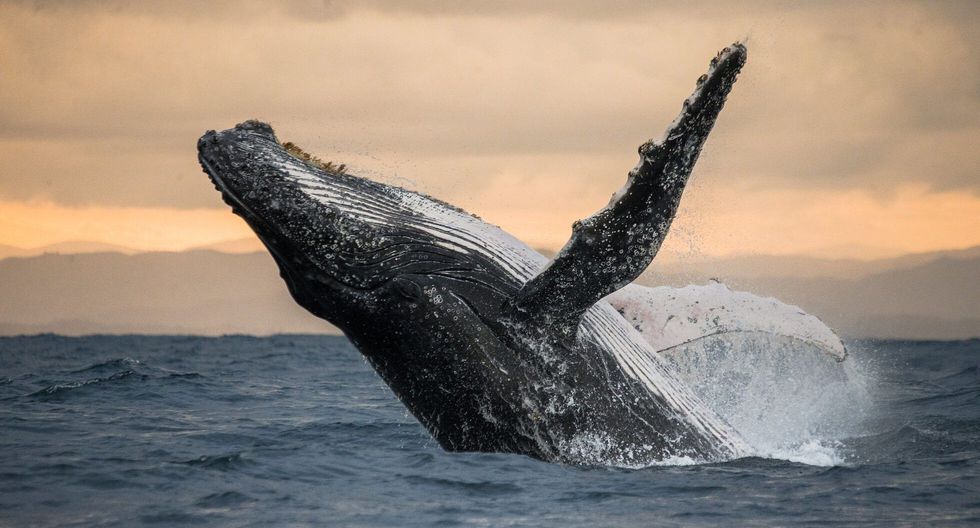Whales are a species of large, intelligent marine animals, and they can be massive in size!
The blue whale is one of the largest creatures ever to exist, followed closely by a sperm whale. The exploding whale phenomenon is not as improbable as you might think.
Though some people mistake whales for fish, they are not. Whales are mammals, like us. Whales spend all their lives in the water. Most whales, when they die, remain in the ocean.
Their bodies decompose at the bottom of the sea and serve as food for the creatures that live in the deep seabed. But sometimes, whales get beached, as in, they get washed up on beaches when they die.
Whales can also beach themselves when they are alive, and it can be because of various reasons, like, storms, illness, following smaller prey, etc. Because of their massive size, they cannot swim in shallow waters, so they get stuck.
It would take the largest types of machinery to help move whales back into the water from the beach. Many beached whales die as they become dehydrated or drown when their blowhole gets covered by water or their weight makes them collapse on land.
But why do whales explode? There can be a variety of reasons behind this phenomenon.
Read on to find out more about why whales explode on a beach. After that, for more relatable content, check out why whales breach and why fishes die when taken out of water.
Can whales explode?
Whales do not explode when they are alive. When they die, and their bodies start decomposing, there have been many instances when they have exploded. So, what is the science behind the whales exploding?
Several factors are in play for a dead whale to explode. Decomposition is a long, steady process caused by microbes that start digesting the animals when they die.
It can take days or months, depending upon the animal's size, as the microbes break down the cells slowly. As blue whales are amongst the largest animals in the world, they take several months or even years to decompose fully.
Decomposition of the blubber, skin, and body parts can produce a lot of gas, and the smell can be unbearable if a dead whale gets beached near a town.
The pungent smell is due to the gas methane. As a result, the authorities can face a lot of pressure for the whale body disposal as quickly as possible, which is a daunting task, given the size of these creatures.
So, in the past, actual explosives have also been used to explode dead decomposing whales as an easier way to move the body away from the coast.
In the process, the explosions break the whale carcass into smaller chunks, and the blubber gets thrown hundreds of meters away without any warning. The area around the carcass will be covered with decomposing whale meat and blood.
Other instances in which the dead whales have exploded were when they were being towed or transported to another place.
What would cause a whale to explode?
Innumerable reasons point to why a dead whale may explode. Not all beached whales will explode, as several factors can cause an explosion.
These include the type of bacteria or microbes in their stomach, the cause of their death, injuries, the food eaten before death, and weather conditions. The decomposition process in colder shores is slow, while it speeds up tremendously in warmer or tropical conditions.
The explosion of dead whales is mainly due to the gas buildup inside their stomach and intestines. The gases released in the stomach and intestines by the bacteria are methane and hydrogen sulfide.
These gases are produced during the process of decomposition. A dead whale’s stomach bloats up with huge amounts of gases, as they cannot escape due to their thick, tough skin. So, the stomach keeps bloating up with gases until the skin cannot expand any longer, and it explodes.
Therefore, a whale’s carcass is a ticking bomb waiting to explode. Whale exploding can also be due to the disturbances caused by human interactions with the carcass.
Decomposition is a long and steady process caused by microbes that digest the animals once they are dead. It may take days or probably even months long for the microbes to slowly break down all the animal's cells.
All of this just solely depends upon the size of the animal. As a blue whale is amongst one of the largest animals in the world, it would take up several months or even years to fully decompose by these microbes.
Why can't you touch a dead whale?

It is given that whales are marvelous creatures, and most people do not see whales in their lifetime. Due to global warming and hunting, whale populations have plummeted over the decades.
So, whale sightings have become extremely rare. But, if you ever happen to come across a beached whale, you obviously would like to approach the animal and see it for yourself, but should you?
Going near a decomposing whale carcass is not recommended, as we cannot tell when it can explode. Given their massive size, we would not know if their stomach looks normal or has been bloated with gases.
Many explosions of the carcass have been recorded due to disruptions made by humans. The trouble can be caused when people start cutting up the whale’s stomach before the perceived explosion, climbing on the carcass, or trying to move the body with a crane.
These disruptions can shake or rupture the bloated stomach, creating an explosion, which can be fatal for the humans in the vicinity.
So, if you ever come across a whale carcass, do not go near or touch it. Make sure that you are hundreds of meters away if you want to see the dead whale.
Do whales ever drown or vomit?
As whales are mammals, they need to come to the surface of the water to breathe. They do this by exposing their blowhole.
Whales can hold their breath for several minutes to sometimes hours together if they go hunting. So, after they dive deep to hunt, they need to swim back to the surface to breathe, and if they do not, they can sink.
Beached whales can also drown in shallow waters if their blowhole is submerged underwater and they cannot turn on the other side to breathe.
When whales die in the ocean, they eventually sink. The seabed will be cold, and the decomposition will be slow.
It can take several decades for a whale to decompose underwater fully. This is known as ‘whale fall.’ As a result, they can be food for an entire ecosystem for several decades, and another reason why whales are so important to marine wildlife.
Generational or traditional hunting of whales has been practiced in several countries worldwide for thousands of years. This hunting practice is for meat, organs, oil, and vomit.
Whale vomit, also known as Ambergris, is a gray, solid, wax-like material that is secreted in the intestines of sperm whales. A single gram of whale vomit can be sold for thousands of dollars.
It is usually used in the perfume industry. At first, the whale vomit will have a strong, pungent smell, but as it ages, it takes on a musky, sweet earthy odor, hence the demand for whale vomit. It is considered illegal to hunt sperm whales to collect Ambergris.
Here at Kidadl, we have carefully created lots of interesting family-friendly facts for everyone to enjoy! If you liked our suggestions for why do whales explode, then why not take a look at why do fish jump or Bryde's whale facts?









